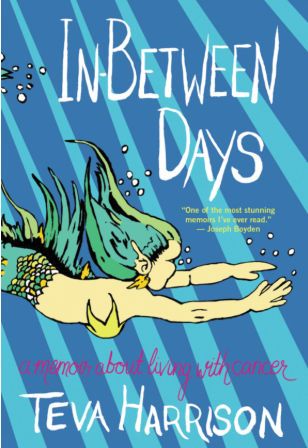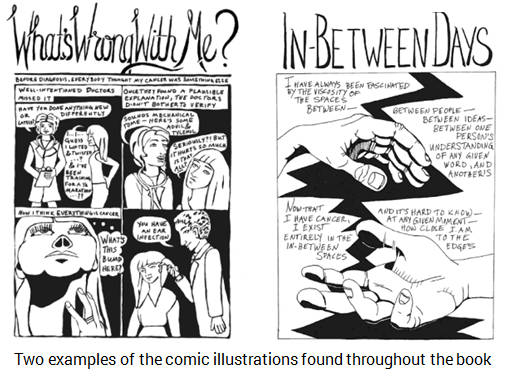
Overview
Teva Harrison was diagnosed at 37 years of age with metastatic breast cancer. Her approach to dealing with this serious health crisis was to work on her mind as well as her body as part of her process of making sense of and coping with what was happening to her. Living in Toronto, Canada at the time of her diagnosis, she had the good fortune to be in the care of an oncology team that included a psychiatrist. As a result of therapy, the author uses her artistic talents to tell her story in a unique series of comic strips and complimentary writings. Text and images are used to explore all the challenges and emotions that have arisen for the author in her new reality. In the words of the author herself:
“I hope that by talking about some of the hard stuff, I am helping other people who are living with cancer or other serious illnesses (and their caregivers and supporters) to start conversations with peers and professionals, with their friends and family and with their doctors.”
How the Book is Organized
The book begins with a Forward and a Prologue. The rest of the book is organized into thee parts with three chapters in each. Each chapter is a series of short musings on related topics. Each ‘entry’ has its own heading and cartoon or illustrations as an integral feature of how the author communicates her experiences and thoughts. The book concludes with a list of resources that the author has found most helpful and is most appreciative of.

Prologue
The author plays with the idea of ‘in-between’ as both a visual-arts and experiential concept. Now that she feels ‘other’ as a result of having a terminal illness, she finds her artist’s understanding of how negative spaces are important to the impact of visual imagery equally applicable as an approach to her writing.
Part One
Diagnosis Learning that I am going to die
What’s Wrong with Me? I Can Feel It In My Bones. Some People Get Lucky. Great Expectations. Whac-A-Mole: A Game of Mets. The Worst Day. Cancer Fraud. Cancer Doesn’t Care.
Teva explores each of these questions and topics as discreet issues following her diagnosis. She deploys her drawings and her writings as a window into her thoughts, her fears, and her physical and mental experiences. Despite the fear and panic, this quest to understand what has happened to her and why is explored without self-pity or self-blame.
Treatment By the skin of my teeth
Wakeful City. On a Platter. As Bad As It Gets. What I Want. Pain Management. When I Wake Up. Animal Testing Y/N.
This chapter consists of a series of vignettes that help the reader understand some of the author’s experiences of the medical world that now dominates much of her life. She recounts key aspects of imaging and treatment and of side effects and complications that give one a window into her experiences of the hospitals, the doctors and the technicians she encounters. The use of high technology and the importance of communication and deductive powers of reasoning are both highlighted as key in figuring out what is disease, how to interpret symptoms, which ones are serious, which ones are manageable, and which ones are side effects. Even in the midst of a lot of suffering the author brings an ability to appreciate the absurd and the humor in situations. At times, however, she really struggles to maintain her normal feistiness in response to some of the stupider things that are said to her by strangers who have no idea what she is going through.
In this section the author doesn’t just describe what is happening to her but explores the choices that she faces in order to find a quality of life balance. Pain or so many opiates that no clear thoughts or activities are even possible; ethics of participating in drug trails that might be lifesaving even if animal testing is involved (the author is anti-animal testing); finding a way to have opportunities to even forget that she is living with cancer.
Side Effects What can be withstood
Shifting Grounds. The Cancer Weight-Loss Plan. The “Big Change”. Splitting Hairs. Homework. Do You Like That? Can’t Be Trusted.
These pieces deal mainly with the impact of the treatments on Teva’s body, especially her ability to be a sexually active woman. In this section the challenges the author face are particularly cruel given her young age for such a serious illness.
Part Two
Marriage Love changes everything
Dancing with My Mister. Once Upon A Time/The World Was Burning/I Was Falling In Love. Sometimes I Just Break. I Can’t Sleep.
Teva explores her powerful connection with her husband David and how her illness brings out different aspects of their relationship. She is profoundly grateful for his love and support and yet some aspects of her experience are hers to live with alone, despite their deep love for each other.
Family A mixed-bag inheritance
The Women of My Family. You’re the Yin to my Yang. Remembrances. Blinded By the Light. In My Blood. Granny’s Legacy.
Teva explores her matrilineal descent in these writings. She teases out the family connections, the patterns of familial cancers and the influence of particular women in her family that impacted her the most. Her paradox is that both her illness – and her strength – is inherited from her family.
Society Finding my way
Invisibilities. The Incremental Erosion of My Independence. Trying on Small Talk and Then What?
Cancer patients don’t usually live in isolation yet – surrounded by family, friends, acquaintances, medical professionals and even strangers – they can feel isolated and cut off. Asking for or receiving help can be challenging. Not feeling guilt about it. Not talking about ones’ illness feels phone. Talking about it can be a buzz kill. And an incurable illness raises the topic of life after death. Teva explores all these questions with compassion towards herself and others.
Part Three
Hopes If wishes were horses
Acts of Hope. The Snowball Fight. Cancer Gratitudes. Mouthful of Wishes.
Teva shows her brave and positive face. Finding silver linings and being grateful takes work in the face of cancer. She is determined to believe that no matter what things could be worse.
Fears They don’t just go bump in the night
A Safe Place. The Dead Bird. Bite Me. Managing Anxiety at Home. A Baby Did a Bad Thing.
In some ways, this section reveals the most about the inner life of the author; Teva shares intimate reflections on her past and unvarnished insight into how she judges herself morally and spiritually. A key outcome of this ‘accounting’ process is that the author learns to be accepting of, and kind to, herself and able to take full responsibility for self-care that is not selfish.
Dreams All tangled up in you
Happily Ever After. The Mermaid Pool. Incurable.
Ultimately Teva concludes that she must live without fear and grasp life as long as she is alive even though she has an incurable disease!
Conclusions and Recommendations
Having read this book in a few short hours and then having thought about it for a few days, it has grown on me more and more. Teva has what may be called an ‘old soul’; she displays a wisdom about life, love and death that is way beyond her years. Some of the best writing one ever comes across has just the right amount of words. Not too many. Not too few. Teva’s writing is like that. Perhaps it is the ability to create effective comic drawings to express her thoughts, feelings and experiences that carries over into a style of writing that successfully does the same thing in a spare – but not sparse – way. Not exactly a diary, this book nonetheless has a diary-like feel to it. The book is all at once hard and sad to read and yet, remarkably, still hopeful. Above all Teva is a realist. She reflects on mortality, religion, superstition and spirituality with a very light touch. Her gratitude for the love and support she has all around her is palpable but not preachy. I think this book is particularly important for family and friends of loved ones dealing with metastatic breast cancer.
Learn more about the book on Teva's website here.
The book is 155 pages long.
Book Reviewed by Rose Barlow, ED, Zero Breast Cancer

